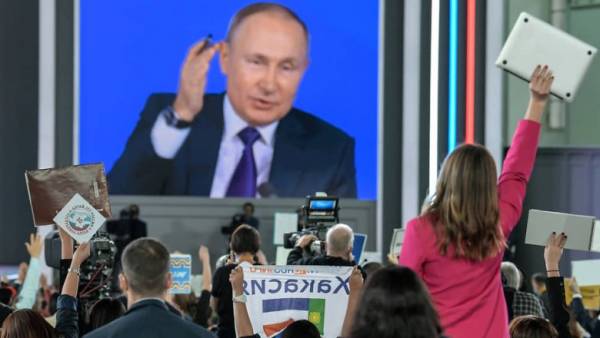
Answering the question about the results of the year for themselves and their family, 5% of respondents called them “very successful”, 40% — “generally good”, 38% — “rather difficult”, 15% – “bad, very difficult” and 2% found it difficult to answer. “We are starting to get out of the pit. The balance is still negative – minus 8 points. But compared to what it was a year ago, everything has improved four times,” commented on these figures at an online conference on December 24, VTSIOM CEO Valery Fedorov. Last year, the negative balance was -33 points.
The results of the year for the country as a whole seem less rosy to Russians.
2% of respondents called 2021 “very successful”, 17% called it “generally good”, 24% called it “bad, very difficult”, 48% called it “rather difficult”, 8% found it difficult to answer. The balance was -53 points (in 2020 -79 points).
“When we talk not about what is close and clear to us, but about what is a little further away, more skeptical and pessimistic assessments are included. This is not news, it is a certain pattern,” Fedorov stressed.
Therefore, respondents evaluate the results of the year for the world as a whole even more negatively: the index was -66 points (last year -83 points).
The emotional background with which Russians see off the outgoing year and meet the new one has not changed much. 60% of respondents “do not feel particularly uplifted, but also without negative emotions” (in 2020 — 61%), 41% — “rather in a good mood, with a sense of optimism” (43%). The number of those who go into the new year “rather with a bad mood, pessimistic expectations” has not changed over the year — 14%.
“It is obvious that the mobility of emotional assessments is expressed much less than rational ones. The New Year is a powerful tool that lifts everyone’s spirits. The hope with which we look into the future is the alpha and omega of the national character for Russians,” Valery Fedorov believes.
12% of respondents believe that in 2021 there was more good than they expected, for 37% the year was worse than expected, and for 49% – about the same as they thought.
The list of the main words of the year is led by “coronavirus” (38%), “price increase” (34%), “QR codes” (28%), “vaccine” (22%) and “income reduction” (21%). And among the main events, vaccination and the fight against coronavirus won unconditionally (21%). Only 8% remembered the elections to the State Duma. However, in the “victory of the year” nomination, the invention of the vaccine remained in second place (5%), losing to the achievements of our athletes at the Olympic and Paralympic Games (7%). As for expectations from the new year, 13% believe that it will be “very successful”, 39% — “generally good”, 35% — “rather difficult”, and 4% – “very bad”.
Vladimir Putin became the politician of the Year (38%), Prime Minister Mikhail Mishustin and Foreign Minister Sergey Lavrov shared the second place (13% each), Defense Minister Sergei Shoigu took the third place (8%). The list of politicians whom Russians would invite to their New Year’s table turned out to be similar: 9% named the leader of the LDPR Vladimir Zhirinovsky, 5% each named Mikhail Mishustin and Sergei Shoigu, 3% each named Sergey Lavrov and Alexei Navalny. And Putin turned out to be the most welcome holiday guest (21%). “But he will come to everyone anyway,” Fedorov joked, referring to the president’s New Year’s address.
As a rule, Russians react to serious difficulties and economic crises by lowering expectations, explains political scientist Boris Makarenko: “This is a sociological law: if expectations from the government decrease, then there is less likelihood of a sharply negative reaction to its actions. Conversely, an increase in the gap between expectations and reality provokes a sharp negative.”
Judging by the VTSIOM survey, people are now in a depressed but passive mood, the expert notes: “Such a mood against the background of the medical and socio-economic consequences of the pandemic is more than expected. But Russians estimate 2021 as less difficult compared to the previous one. There is less pessimism, and this is already good news.”
At the same time, the influence of the government itself on these sentiments is very relative, Makarenko adds: “In this situation, probably no government in the world could inspire its people with optimism. But there is certainly a merit of the authorities in not allowing pessimism to reach extreme alarmist values.”
Ksenia Veretennikova